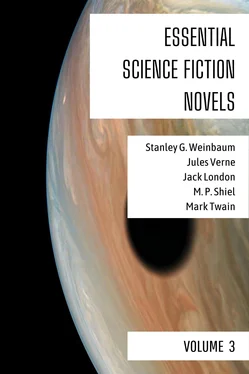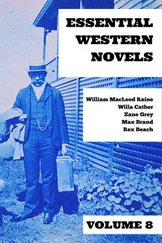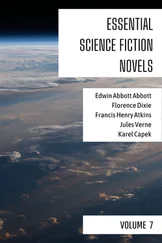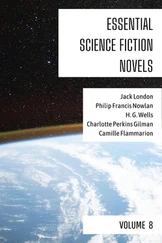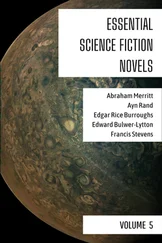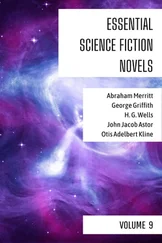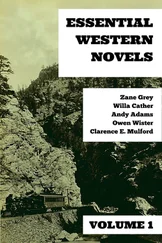“I was one of these scouts; and Doctor Hoyle, remembering that his motor car had been left behind in his home garage, told me to look for it. We scouted in pairs, and Dombey, a young undergraduate, accompanied me. We had to cross half a mile of the residence portion of the city to get to Doctor Hoyle's home. Here the buildings stood apart, in the midst of trees and grassy lawns, and here the fires had played freaks, burning whole blocks, skipping blocks and often skipping a single house in a block. And here, too, the prowlers were still at their work. We carried our automatic pistols openly in our hands, and looked desperate enough, forsooth, to keep them from attacking us. But at Doctor Hoyle's house the thing happened. Untouched by fire, even as we came to it the smoke of flames burst forth.
“The miscreant who had set fire to it staggered down the steps and out along the driveway. Sticking out of his coat pockets were bottles of whiskey, and he was very drunk. My first impulse was to shoot him, and I have never ceased regretting that I did not. Staggering and maundering to himself, with bloodshot eyes, and a raw and bleeding slash down one side of his bewhiskered face, he was altogether the most nauseating specimen of degradation and filth I had ever encountered. I did not shoot him, and he leaned against a tree on the lawn to let us go by. It was the most absolute, wanton act. Just as we were opposite him, he suddenly drew a pistol and shot Dombey through the head. The next instant I shot him. But it was too late. Dombey expired without a groan, immediately. I doubt if he even knew what had happened to him.
“Leaving the two corpses, I hurried on past the burning house to the garage, and there found Doctor Hoyle's motor car. The tanks were filled with gasoline, and it was ready for use. And it was in this car that I threaded the streets of the ruined city and came back to the survivors on the campus. The other scouts returned, but none had been so fortunate. Professor Fairmead had found a Shetland pony, but the poor creature, tied in a stable and abandoned for days, was so weak from want of food and water that it could carry no burden at all. Some of the men were for turning it loose, but I insisted that we should lead it along with us, so that, if we got out of food, we would have it to eat.
“There were forty-seven of us when we started, many being women and children. The President of the Faculty, an old man to begin with, and now hopelessly broken by the awful happenings of the past week, rode in the motor car with several young children and the aged mother of Professor Fairmead. Wathope, a young professor of English, who had a grievous bullet-wound in his leg, drove the car. The rest of us walked, Professor Fairmead leading the pony.
“It was what should have been a bright summer day, but the smoke from the burning world filled the sky, through which the sun shone murkily, a dull and lifeless orb, blood-red and ominous. But we had grown accustomed to that blood-red sun. With the smoke it was different. It bit into our nostrils and eyes, and there was not one of us whose eyes were not bloodshot. We directed our course to the southeast through the endless miles of suburban residences, travelling along where the first swells of low hills rose from the flat of the central city. It was by this way, only, that we could expect to gain the country.
“Our progress was painfully slow. The women and children could not walk fast. They did not dream of walking, my grandsons, in the way all people walk to-day. In truth, none of us knew how to walk. It was not until after the plague that I learned really to walk. So it was that the pace of the slowest was the pace of all, for we dared not separate on account of the prowlers. There were not so many now of these human beasts of prey. The plague had already well diminished their numbers, but enough still lived to be a constant menace to us. Many of the beautiful residences were untouched by fire, yet smoking ruins were everywhere. The prowlers, too, seemed to have got over their insensate desire to burn, and it was more rarely that we saw houses freshly on fire.
“Several of us scouted among the private garages in search of motor cars and gasoline. But in this we were unsuccessful. The first great flights from the cities had swept all such utilities away. Calgan, a fine young man, was lost in this work. He was shot by prowlers while crossing a lawn. Yet this was our only casualty, though, once, a drunken brute deliberately opened fire on all of us. Luckily, he fired wildly, and we shot him before he had done any hurt.
“At Fruitvale, still in the heart of the magnificent residence section of the city, the plague again smote us. Professor Fair-mead was the victim. Making signs to us that his mother was not to know, he turned aside into the grounds of a beautiful mansion. He sat down forlornly on the steps of the front veranda, and I, having lingered, waved him a last farewell. That night, several miles beyond Fruitvale and still in the city, we made camp. And that night we shifted camp twice to get away from our dead. In the morning there were thirty of us. I shall never forget the President of the Faculty. During the morning's march his wife, who was walking, betrayed the fatal symptoms, and when she drew aside to let us go on, he insisted on leaving the motor car and remaining with her. There was quite a discussion about this, but in the end we gave in. It was just as well, for we knew not which ones of us, if any, might ultimately escape.
“That night, the second of our march, we camped beyond Haywards in the first stretches of country. And in the morning there were eleven of us that lived. Also, during the night, Wathope, the professor with the wounded leg, deserted us in the motor car. He took with him his sister and his mother and most of our tinned provisions. It was that day, in the afternoon, while resting by the wayside, that I saw the last airship I shall ever see. The smoke was much thinner here in the country, and I first sighted the ship drifting and veering helplessly at an elevation of two thousand feet. What had happened I could not conjecture, but even as we looked we saw her bow dip down lower and lower. Then the bulkheads of the various gas-chambers must have burst, for, quite perpendicular, she fell like a plummet to the earth.
“And from that day to this I have not seen another airship. Often and often, during the next few years, I scanned the sky for them, hoping against hope that somewhere in the world civilization had survived. But it was not to be. What happened with us in California must have happened with everybody everywhere.
“Another day, and at Niles there were three of us. Beyond Niles, in the middle of the highway, we found Wathope. The motor car had broken down, and there, on the rugs which they had spread on the ground, lay the bodies of his sister, his mother, and himself.
“Wearied by the unusual exercise of continual walking, that night I slept heavily. In the morning I was alone in the world. Canfield and Parsons, my last companions, were dead of the plague. Of the four hundred that sought shelter in the Chemistry Building, and of the forty-seven that began the march, I alone remained—I and the Shetland pony. Why this should be so there is no explaining. I did not catch the plague, that is all. I was immune. I was merely the one lucky man in a million—just as every survivor was one in a million, or, rather, in several millions, for the proportion was at least that.”
“For two days I sheltered in a pleasant grove where there had been no deaths. In those two days, while badly depressed and believing that my turn would come at any moment, nevertheless I rested and recuperated. So did the pony. And on the third day, putting what small store of tinned provisions I possessed on the pony's back, I started on across a very lonely land. Not a live man, woman, or child, did I encounter, though the dead were everywhere. Food, however, was abundant. The land then was not as it is now. It was all cleared of trees and brush, and it was cultivated. The food for millions of mouths was growing, ripening, and going to waste. From the fields and orchards I gathered vegetables, fruits, and berries. Around the deserted farmhouses I got eggs and caught chickens. And frequently I found supplies of tinned provisions in the store-rooms.
Читать дальше
